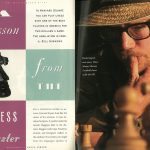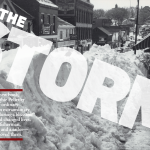NEW ENGLAND HAS often claimed the poems, songs, and ditties known as the Mother Goose nursery rhymes even though, I’ll have to concede, their origin was most assuredly in England during the 1600s. But at least there is a New England connection. That connection stems back to an Elizabeth Foster of Charlestown, Massachusetts, who married one Isaac Goose of Boston. As the legend goes, she recited these nursery rhymes to her grandchildren so often that, about 1719, one of her sons-in-law, Thomas Fleet (a printer by trade), decided to put them in book form under the title
Songs of the Nursery or
Tales from Mother Goose or
Mother Goose’s Melodies for Children — or
something. The reason we’re not sure about the title is that no one has ever found a copy of this legendary little book, even though it’s often listed under that 1719 date in American bibliographies. Listed in Boston tourist brochures today is the tombstone of what is referred to as “The Original Mother Goose,” located near the Paul Revere monument in the Old Granary Burying Ground on Tremont Street.
I’ve walked through the Old Granary many times and noted all the Gooses (Geese?) buried there, including “Mary Goose, wife to Isaac.” Mary was apparently Isaac’s first wife. I’ve never found Elizabeth Foster, his second wife, however. Oh, well. As “Mother Goose” (whoever she/he was) once wrote:
For every riddle under the sun,
There is an answer or there is none.
If there be one, try and find it;
If there be none, never mind it.
It’s interesting to me to realize that while New Englanders will happily enjoy fanciful legends about Humpty Dumpty, Little Bo-Peep, and all the other Mother Goose characters, we cannot seem to forgive artistic license in literature on matters pertaining to common sense. For instance, a number of fishermen and seafaring New Englanders whom I’ve spoken with over the years have no use for Herman Melville and his book
Moby Dick. There are too many nautical inaccuracies in it. They always point out that no whaling captain would ever have allowed his ship’s tiller to be made from a whale’s jawbone.
“Too damn brittle,” a Martha’s Vineyard old-timer once shouted at me. “They never would have trusted it. It might have snapped like a pipe stem in a big sea and then the Pequod would have been without a steering gear. No, sir. They never, never would have done it!”
So much for
Moby Dick.







